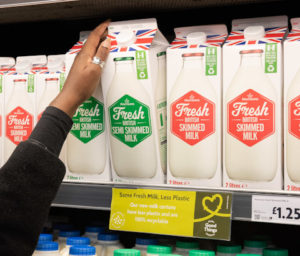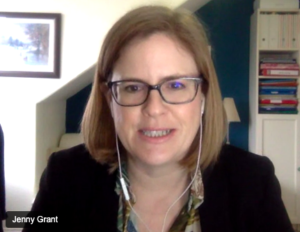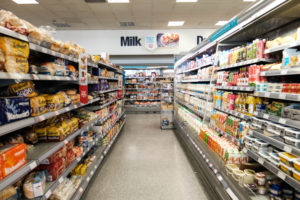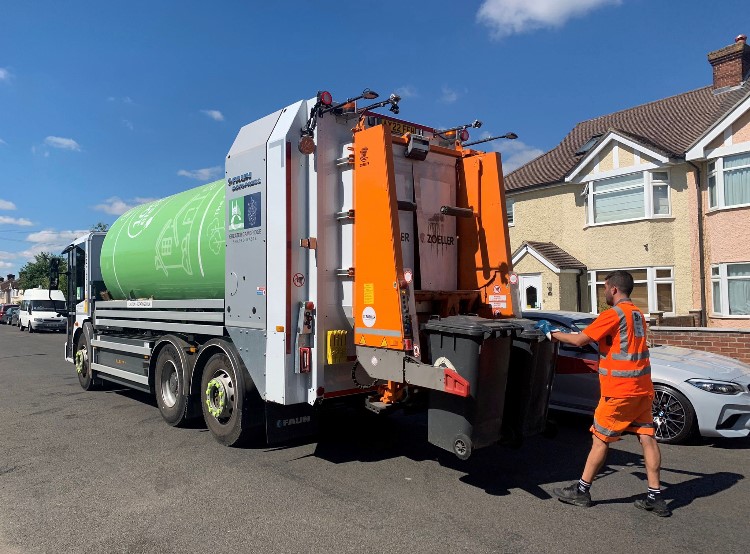The move has been widely welcomed by the sector, though concerns have been raised from the paper industry that commingling is allowed. Many had been hoping for paper and card to be separated.
Below you can find a range of opinions from across the sector which formed part of our live blog, which has now closed.
CAG Oxfordshire questions aspects of legislation
Billy Maxwell, chair of Community Actions Group Oxfordshire, outlined that while any clarity from government is positive, he does have concerns.

He outlined that confirming universal weekly food waste and financial help for councils with this is important, as is having a single set of materials collected everywhere and labelling on products to match.
He added: “But does copying everything that (not all, but many) of the highest performers do, make sense? Looking at the recycling league tables, the current top recycling district, Saint Albans, is actually eighty-sixth for KG of waste per person. For the likes of East Riding (in the top ten) they are three hundred and forty seventh by this measure! So hardly waste reducers. What does mark the top ten is that they are all in affluent rural areas. It seems that the reason they do well is the large gardens these districts have, supplying waste that, as it is heavy, gets counted as recyclate and inflates their position. This level of garden waste will never be achievable in dense urban areas.
“Looking at the recycling tables on the basis of dry mixed recyclate alone, then the evidence for commingling vanishes. It also reduces quality and increases GHG emissions, requiring the additional MRF processing stage. Anyone who has ever run or even visited a MRF knows the challenge of extracting clean and reject-free material. The fact is that ‘Simpler Recycling’ is unlikely to move us towards a more circular economy. It will more likely act to dampen progressive systems designed for the needs of different geography’s and demography’s.
“Yes it will improve things, particularly in some areas that could and should, be able to do better. But will it create the step change across the board so desperately needed? Is Simpler Recycling a game changer? The cynic may say it is more like recycling, over-simplified…”
Minimum fortnightly residual collections a ‘retrograde step’ Suez says
Dr Adam Read, chief external affairs and sustainability officer for SUEZ recycling and recovery UK said while the Simpler Recycling announcement is good news, he did have some concerns.
He said the information released on Saturday on the government’s simpler recycling reforms provides the sector with some “much needed clarity on the timescale for change and the range of items people will be able to recycle in the future.”

However, the scale of change these reforms will deliver “remains to be seen with the prospect of exemptions for separate food waste collections and the removal of the ‘TEEP test’ barrier for mixed recycling collections”.
He said: “We need to improve not only the quantity but also the quality of the recycling we collect if we are to drive a more circular economy with brands receiving the materials they need for new packaging.
“It was disappointing to see the announcement perpetuate populist perceptions about the inconvenience of having more than one recycling bin when our experience shows this can work well in the right areas. Equally, insisting on minimum fortnightly rubbish collections for councils already successfully running less frequent collections would seem to be a retrograde step and without any funding to support a switch to more frequent collections more open discussions will be needed to get all parties on board in the short timeframe available.”
Plans will ‘combat waste crime and improve standards’
Michael Benton, managing director of Reconomy’s recycle division, explained that alongside the Simpler Recycling legislation, Defra also outlined plans to “address weaknesses in the current system that make it hard for regulators to target high risk, illegal waste operators”.
He added that separate proposals “also seek to introduce a mandatory digital waste tracking service to make it simpler to track waste and resources produced from waste throughout the economy and enable users to provide the right information at the right time”.
The UK-wide digital waste tracking service requirements will replace the existing requirements to complete waste transfer notes and hazardous waste consignment notes.
On this, he said: “We welcome the government’s proactive steps to fight waste crime and drive ever-increasing standards in terms of traceability and data in the waste sector. Poor practise needs to be eradicated and these proposals provide a far stronger arsenal for the regulator to combat high-risk operators so we can eliminate waste crime in this country.
“The mandatory digital waste tracking service creates a cohesive UK-wide system to begin tracking the over 200 million tonnes of waste produced every year. Dynamic, accurate data underpinned by innovative technology lies at the heart of robust management of supply chains and waste which can drive a thriving circular economy in the UK so these reforms mark an exciting step forward.
“Reconomy has been providing data to support the development of digital waste tracking and we believe this will lead to improved outcomes in moving materials higher up the waste hierarchy to protect the environment. The proposals will also increase visibility for our customers and all waste producers, which will help demonstrate the tangible benefits of more efficient waste management practises.”
NAWDO highlights lack of clarity
The National Association of Waste Disposal Officers explained that while it welcomes the announcement at the weekend of Simpler Recycling, and the publishing of the Government’s response to the 2021 consultation, there is a “lack of detail” in number of key areas.
A spokesperson explained that there is not certainty with regards to funding, “whether that is coming from the government under the New Burdens doctrine for food waste, or from producers through EPR for packaging.
“Funding certainty is critical for local authorities to be able to make investment decisions at a time when they face increasing levels of financial pressure,” the NAWDO spokesperson said.
On infrastructure, NAWDO is concerned that, despite some compliance dates being pushed back to 2026, there is a lack of appropriate infrastructure in place to meet the Government’s ambitions on expanding recycling services to a larger core set of materials and introducing universal food waste collections for households.
“It is unlikely that new sorting and re-processing infrastructure can be brought forward by March 2026, meaning that local authorities may be forced to collect materials for which there is no viable market,” the spokesperson explained.
LARAC raises procurement concerns
Cathy Cook, chair of the Local Authority Recycling Advisory Committee (LARAC), has welcomed most of the announcements this weekend, but has some concerns over procurement bottle necks and limits to residual waste collections.

She said LARAC challenges the governments assertion that weekly food waste collections will reduce landfill waste after collection blueprints in Wales and Scotland have shown otherwise.
Defra revealed a proposal to “include in guidance an expectation” that residual waste is collected at least fortnightly, “helping avoid long waits for smelly waste to be removed”.
Ms Cook said: “We applaud most of the announcements in the consistency response. Notably, our members now have the freedom to choose how they collect dry mixed recycling and the option to charge for garden waste. Introducing flexible plastic collections in 2027 and weekly food waste collections in 2026 is also a welcome step. However, we remain concerned about potential bottlenecks and price hikes resulting from concurrent procurement by local authorities.
“We find the proposal to restrict residual waste collections to at least fortnightly disappointing. Collection Blueprints in Wales and Scotland have shown how limiting residual collections while providing weekly food waste collections is instrumental in encouraging recycling and minimising non-recyclable waste. Feedback from our members underscores that, on average, 40% of household rubbish is food waste. Weekly and fortnightly refuse collections do not incentivise food waste recycling. Therefore, we challenge the government’s assertion that weekly food waste collections alone will significantly reduce landfill waste.”
WRAP welcomes ‘clearer directions’ for councils but notes MRF challenges
WRAP outlined that the government policies on Simpler Recycling give “clearer direction” to local authorities when it comes to investment decisions.

Claire Shrewsbury, director of insights and innovation at WRAP backs the government’s decision as making recycling simpler will make it easier to run campaigns to encourage people to recycle and removes the “postcode lottery”.
Ms Shrewsbury said: “It’s good to see the publication of the Government’s response to its recycling consultation, and the inclusion of the six key materials and universal food waste collections in England. Making recycling simpler will make it easier to run nationwide communications campaigns to ramp up the recycling rate, and removes the postcode lottery of what’s in, what’s out. And encouraging that more than 2.2 million businesses will now be required to separate their waste for recycling.
“However, continuing to have comingled collections means that many material recycling facilities, which receive this mixed material, will need to look at investment and upgrading to ensure they can produce the quality recyclate required. But for local authorities, today gives clearer direction and more certainty they need to make important investment decisions around their own operations, with a timeline. WRAP will work with trade bodies and local authorities to make any transition as seamless as possible through our tools, technical support, and resources.”
Valpak says Simpler Recycling is ‘good news’ for producers
The producer compliance scheme Valpak believes the announcement is “good news” for packaging producers as it will enable them to plan ahead.

The company, part of the Reconomy Group, backed the government measures as they give bodies such as local authorities and producers the guidance needed to need to “inform service arrangements and infrastructure”.
Steve Gough, chief executive of Valpak, said: “This clarity around waste collections will help local authorities, waste managers and producers to plan ahead. Local authorities have been waiting for guidance to inform service arrangements and infrastructure, but the announcement is equally good news for packaging producers.
“Successful recycling hinges on consumer participation. With consistent recycling collections in place across England, packaging brands and retailers will be in a much better position to communicate with householders, via labelling on products or through direct messaging. It is this communication that will drive recycling to the next level.
“While the schedule for changes to household collections by 2026 gives plenty of time for service changes, it also ties in with EPR payments, bringing coherence to the wider EPR system. The decision to scrap TEEP will appeal particularly to some authorities, which have felt constrained by the current arrangements. At the same time, the introduction of weekly food waste collections should have a major impact on circularity across England.”
CPI says ‘deeply disappointing’ response a ‘step backwards’
The Confederation of Paper Industries (CPI) has expressed “deep disappointment” at the government’s announcement not to introduce separate collections of paper and card.
This decision, along with the intention to introduce exemptions to allow for commingled collections, was described as “profoundly disconcerting”. This follows concern also raised by the Recycling Association.
Dimitra Rappou, executive director for sustainable products at the CPI, reasoned that the quality of materials collected has been “overlooked”, which she said will lead to an increase in contamination, drive up reprocessing costs, and consequently deter investment in the paper recycling sector.

Ms Rappou said: “To ensure high quality output, collection systems are key. Although initially supportive of the proposed reforms to the Resources and Waste Strategy, CPI advocated that the only way to enhance recycling systems is by increasing both the quantity and the quality of recyclable materials via separate collections for paper and card.
“It is both surprising and concerning that, despite the extended time taken to release this response, Government has neglected crucial environmental considerations. The limited references to quality in the response itself epitomises the Government’s neglect of this aspect of collections and reinforces the perception that its only focus is quick and easy wins to increase recycling rates. Such gains are likely to be illusory as much of the recovered material may be too contaminated to either recycle in the UK efficiently or sell abroad.
“With multiple studies endorsing separate collections as the most effective means to enhancing both the quality and quantity of materials collected, this response is a step backwards.”
Policy a ‘vital step’, Ecosurety says
Robbie Staniforth, policy and innovation director at the compliance scheme Ecosurety, explained that the proposals are very “similar to what we had anticipated”.
He added that the setting of “a clear horizon” for what citizens can expect to be collected from their homes and places of work is a “vital step towards greater participation and confidence in the recycling system”.

Mr Staniforth explained: “The action on plastic, in particular, lays down the challenge for the EPR Scheme Administrator, local councils, waste management companies and end reprocessors. It is pleasing to see that plastic pots, tubs and trays will be collected from businesses by 2025 and households by 2026.
“We are humbled that the Government has credited our Flexible Plastic Fund initiative for the work undertaken to pilot collection and recycling infrastructure in their announcement. We look forward to passing on our learnings to the EPR Scheme Administrator as soon as is practicably possible so that they can scale up the collection of plastic films and flexibles well in advance of the 2027 mandatory deadline.”
Hayward-Higham highlights further uncertainty
Posting on Linkedin, Stuart Hayward-Higham, chief technical development & innovation officer ay Suez, said it is pleasing to see that Defra has published its Simpler Recycling response to the original consistency of collection consultation and worth thereafter.
He said however that “for investment certainty its really important to have definition, dates and targets that will drive certainty and deliver investment and change”.
Mr Hayward-Higham said: “A number of elements of the proposals remain to be confirmed and the legislation itself is required to cement that certainty, but its great to see things moving again.
“More ‘sub’ consultations are due, the detail around the exemptions is needed and ultimately the legislation is required to provide the final foundation. Challenging to see how the residual waste proposals can drive more recycling, how the technicalities of materials combinations and mechanical recycling can be reflected in the collection systems and how quality of recycled products can be maintained and improved through all the changes.”
Encyclis welcomes Simpler Recycling measures
Owen Michaelson, chief executive of energy from waste plant operator Encyclis, welcomed the publication of Simpler Recycling.
He said the company backs measures to make recycling simpler and in line with the waste hierarchy, “every effort must be made to ensure that overall waste is reduced and that clean, recyclable materials are indeed recycled”.

Mr Michaelson said: “Doing so requires a combined effort at all stages, from the manufacturers of packaging materials through to householders disposing of waste correctly, local authorities and waste sorting operations.
“The purpose of our energy recovery facilities is to make best possible use of what’s left after everything that can be recycled has actually been recycled. Our facilities provide an essential service within the UK’s waste infrastructure, turning residual waste into sustainable baseload electricity, recovering remaining materials for productive use and providing a heat source for the proposed district heat networks that could help decarbonise communities throughout the country.”
LGA welcomes Simpler Recycling publication
The Local Government Association has hailed the government for not “significantly reducing the flexibilities in how councils collect waste from people’s homes”.

Cllr Darren Rodwell, environment spokesperson for the Local Government Association, said: “Public satisfaction with local waste services remains very high, which councils have worked hard to achieve.
“What works in urban centres is different to rural communities. We are pleased the Government has listened to the LGA and councils and decided not to significantly reduce the flexibilities in how councils collect waste from people’s homes.
“Our national ambitions for waste and recycling will only be achieved by fully empowered local delivery, alongside measures transferring the costs from taxpayers onto the waste producers.
Still ‘urgent need’ for investment, Graveson says
Veolia’s Gavin Graveson described the move as a welcome step forward, but warned there is still an “urgent need” for investment in the industry.
Mr Graveson, Veolia’s senior executive vice president for Northern Europe, said as part of Defra’s announcement: “[The] simpler recycling announcement is a welcome step forward to improve the quantity and quality of material that we process. We now need to quicken the pace of UK recycling rates by ensuring that packaging is designed to be reused, repaired or recycled.

“There is still an urgent need for waste reforms, policy visibility, and investment. We strongly suggest that the Government consider escalating the plastic packaging tax to a minimum 50% recycled content to stimulate the market without creating a burden for the taxpayer and focus Extended Producer Responsibility on hard to recycle materials such as laminates and composite materials. We need stability in the recycling market to underpin investments so we can stimulate the green economy, create jobs and bring us closer to our net zero goals.”
Full list of items included in Simpler Recycling
With Defra’s formal response arriving over the weekend, some of the finer details were included within this document
This includes the detailed breakdown of what is included as part of the Simpler Recycling rules.

Cartons for food, drink and other liquids, including aseptic and chilled cartons, will be included in the plastic recyclable waste stream to be collected from households and non-household municipal premises. Where local authorities and other waste collectors opt to collect plastic separately from other dry materials, collecting cartons in the plastic recyclable waste stream will enable more cartons to be effectively sorted and reprocessed, Defra said.
All paper and card will be collected except for that which contains glitter or foil, paper that is laminated, stickers and sticky paper, padded lined envelopes, paperback and hardback books and wallpaper.
For metals, this will cover steel and aluminium tins and cans, steel and aluminium aerosols, aluminium foil, aluminium food trays, steel and aluminium jars and bottle lids and aluminium tubes.
For plastic, all councils must collect plastic bottles made of PET, including recycled PET, polypropylene (PP) and high-density polyethylene (HDPE).
They must also collect pots, tubs and trays made of the same materials.
Also included for plastic are PP plastic tubes larger than 50mm x 50mm, cartons for food, drink and other liquids, including aseptic and chilled cartons, plastic film packaging and plastic bags made of mono-polyethylene (mono-PE), mono-polypropylene (mono-PP) and mixed polyolefins PE and PP, including those metallised through vacuum or vapour deposition (to be included from 31 March 2027).
Glass packaging will cover bottles and jars.
ADBA says food waste collections ‘a great step’
Charlotte Morton OBE, chief executive of the Anaerobic Digestion and Bioresources Association (ADBA), explained that Separate food waste collections are the “cornerstone” for an effective implementation of Defra’s Food and Drink Waste Hierarchy.
Ms Morton outlined that now local authorities and AD operators can “plan with confidence” to put contracts and infrastructure in place to ensure inedible food waste goes to AD treatment as the first recycling option.

She said: “The food waste collected will provide an invaluable new source of feedstock for AD plants to produce renewable gas for heat, electricity and transport fuel, and biofertilisers for soil health and improved crop yields.
“It’s a great step forward to establish a circular economy around food waste and food production for the benefit of all, and to ensure increased energy and food security in England. We’re all winners in this and it is imperative that no further delays are incurred in rolling out separate food waste collections.”
We’re rolling out a new, simpler approach to recycling across England to:
♻️ drive up recycling rates
🚛 end the postcode lottery of bin collections
🌍 help us move one step closer to a circular economy and meet ambitious net zero goals
Read more: https://t.co/dzayUZ76a2 pic.twitter.com/YsUv0ExwSD
— Defra UK (@DefraGovUK) October 21, 2023
CIWM welcomes clarity but has several concerns
The Chartered Institution of Wastes Management (CIWM) said it is “somewhat surprised” that the implementation date for business collections is ahead of the implementation date for households, “given that the payment details for these collections have yet to be agreed”.
The association added that there are also concerns about the timescales involved for all local authorities to undertake “what are potentially significant service changes”, and for the private sector to bid into the relevant contracts.

CIWM also questions the arrangements for the consultation on the statutory guidance that local authorities will need to follow for Simpler Recycling and believes it should be open to all within the industry to respond to.
Lee Marshall, CIWM policy & external affairs director, said: “We have been waiting for this announcement for what feels like an age, so it is great that we now have the details. The flexibility around collection systems appears to be a sensible way forward and I am sure local authorities will be pleased with that approach.
“The deadlines for implementation, especially for film, remain challenging given the delays we have had, and there will be concern about procurement bottlenecks that these relatively short deadlines may cause.
“The proposal to restrict residual frequency to a maximum of fortnightly is, however, unwelcome, as there are numerous examples of how this helps increase recycling and makes collections more cost effective.”
REA says organics recycling a ‘win-win’
The government’s announcement that all households will have a food and garden waste collection was welcomed by the Association for Renewable Energy and Clean Technology (the REA).
Jenny Grant, head of organics and Natural Capital at the association, explained that the government’s planned implementation dates for when food and garden wastes must be collected from households and for business food waste collections, “although later than originally planned”, now give certainty to industry to ensure “we are making the most of these valuable bioresources and their contribution to meeting the Net Zero targets”.

Ms Grant said: “We have had members with projects on hold, so the publication of planned implementation dates will aid businesses and local authorities, to make progress with their plans.
“Treating food and garden wastes by organically recycling them is a win-win. It enables the production of renewable energy (electricity, heat, gas and transport fuels), reduces biowaste-driven emissions from landfill, reduces contamination of other recycling streams, enables the production of biofertilisers and soil improvers to benefit soils, reduces the need for fossil-derived fertilisers and can partially replace peat in growing media.
“We also welcome the new consultation on the additional policies, and we look forward to working with members and Government to provide further comments on the statutory guidance including allowing co-collection of suitable waste types without submitting a justification in writing.”
OPRL says update ‘prompt and clear’
Margaret Bates, executive director at OPRL, described the statement as a “prompt and clear” message that will make planning and operations more efficient for local authorities, packaging producers and waste managers.
Ms Bates said Defra has clearly “worked hard to clarify the detail of Simpler Recycling as quickly as possible, and this statement should be a welcome assurance for local authorities and wider industry”.

She explained: “By March 2026, householders in England will all have the same materials collected by their council, which will reduce confusion and increase recycling. The removal of the current TEEP exemption system will give local authorities the freedom to collect material in the most efficient way, and to ensure that recycling rates are increased, whether that is by comingled or separate collections.”
Ms Bates concluded: “After listening to industry and tackling concerns around consistency, Simpler Recycling represents another important building block in England’s EPR system. We are gaining momentum now and, once in place, we can hope to have a world-class system that will bring about a real step change in recycling.”
FDF says plans a ‘welcome step’ but wants producer ownership of packaging
The Food and Drink Federation (FDF), which counts some of the largest UK producers as its members, has urged the government to ensure investment now goes into Britain’s “fragmented and dated recycling infrastructure” in order to drive a circular economy.
The FDF’s director of corporate affairs and packaging Jim Bligh said: “We’re pleased to see the government publishing their much-delayed plans for Simpler Recycling today, and making a first step towards creating the conditions necessary to establish a circular economy in the UK.

“Making it easier for households to recycle the same materials wherever they live in England is critical to driving up England’s recycling and reuse rates.
“Food and drink producers will soon be paying an annual bill of £2 billion to fund the circular economy, known as Extended Producer Responsibility (EPR). Getting Simpler Recycling up and running quickly, efficiently and effectively is therefore important to us and government will need to act decisively to ensure sufficient investment now goes into Britain’s fragmented and dated recycling infrastructure.
“To do this, and as happens in world-leading circular economies such as Canada, industry must be given ownership of packaging materials throughout their lifespan and operational control of the recycling system. If this can be done, there will be huge benefits for consumers – in driving down the costs of recycling and driving up the use of recycled packaging for everyday products.”
ESA welcomes plans but has ‘significant questions’
The Environmental Services Association (ESA) explained that while it welcomes the proposals, there remains “significant” questions which need answering.
Jacob Hayler, the executive director of the ESA, explained that after “five years of uncertainty and delay”, the ESA welcomes the announcement, which brings greater clarity to the UK’s recycling and waste sector about the range of materials that all councils and businesses must collect and when.

In terms of unanswered questions, he said “significant questions” still require answers though before “our industry can invest in new recycling infrastructure to meet these requirements”.
Mr Hayler said: “In particular, we need to understand the detail of how Simpler Recycling will work with the emerging Extended Producer Responsibility (EPR) regime for packaging – whereby packaging producers will pay for the system – and any constraints imposed on how councils collect materials at the kerbside.
“As a result of weak enforcement and paltry penalties, criminality in our sector significantly undermines legitimate industry and threatens investment. We welcome the crackdown on illegal waste carriers and the closure of a significant loophole in the regulations.”
Recycling Association questions commingling
The Recycling Association chief executive Paul Sanderson said Simpler Recycling “should end the confusion” around what can and can’t be recycled, but said he was “disappointed” that commingling will be allowed.

The association had been calling for a twin-stream system “at a minimum” with paper and card separated from other materials.
He said: “That would have avoided contamination and enabled better quality of paper and cardboard, but also the other materials where paper can act as a contaminant.
“The fact that Simpler Recycling will also apply across households and businesses will make it easier for people, whether at work or at home, to understand what can and can’t be recycled. That is a definite positive from Simpler Recycling.
“We would have preferred commercial and household collections under Simpler Recycling to be launched at the same time in 2025 but recognise that a great deal of progress has been made to bring about consistent recycling under these measures. At least now, our industry can start to plan with some certainty.”










Subscribe for free